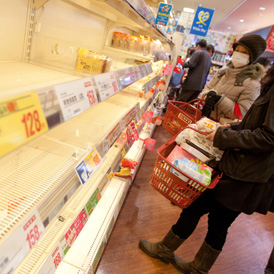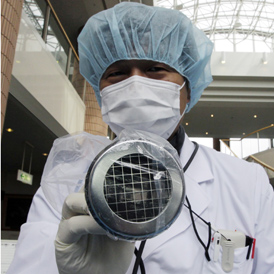Japan: iodine supplies dwindle amid radiation fears
Radiation fears in Japan have sparked panic buying of potassium iodide tablets, but a radiation expert has told Channel 4 News it is “entirely unnecessary”.

Suppliers in Asian countries and the United States have seen a spike in demand for potassium iodide supplements, after concerns that radiation released from Japan’s Fukushima Daiichi nuclear plant could spread.
The price of potassium iodide tablets – which are used to protect the thyroid gland if taken before or shortly after a person is exposed to radiation – has also skyrocketed, with prices climbing to as high as $500 a packet.
But radiation expert Professor Richard Wakeford at the University of Manchester told Channel 4 News there is no immediate threat of radiation poisoning in Japan, let alone in the US.
“The levels being seen in Japan at the moment are well clear of any levels that you need to see an immediate effect,” Professor Wakeford said.
Get the latest on our Japan live blog
“This sort of panic-buying is entirely unnecessary. They’re wasting their money. I’ve heard stories of people on Ebay selling iodine tablets for up to $300.”
“This sort of panic buying is entirely unnecessary. They’re wasting their money.” Professor Richard Wakeford, radiation expert at University of Manchester
He says the current levels for people outside the plant are almost negligible.
“I can’t believe that the doses experienced in Japan at the moment could pose a serious risk in food and water. An abdominal CT scan would give you between 10 and 20 millisieverts. But people in Japan aren’t getting levels anywhere near that.”
Leading US manufacturers Anbex Inc and Fleming Pharmaceuticals have been struggling to keep up with demand.
Anbex President, Alan Morris, said his company had sold out of more than 10,000 14-pill packages and did not expect further supplies until April.
Several pharmacies in China have also run out of iodine pills and medical masks, as concerned citizens rush to stockpile supplies.
“We have just sold out. The stock is small, so we ran out of the pills quickly. Customers bought every kind of iodine pills without even asking what the medicine is used for,” a salesman at Lei Yunshang Pharmacy said.
On Tuesday evening, radiation levels around Tokyo were less than 1 microsievert. While that is nearly 10 times normal readings, experts say that amount of radiation is very minimal and even smaller than a dental x-ray, which is about 10 microsieverts.
Professor Wakeford says significant exposure to radiation can cause cancer in the long-term. But he says even those working inside the nuclear plant should not be seriously affected if their levels are monitored.

“It’s a balance of risk, between what those workers are being exposed to and what would happen if you didn’t have them at the plant.
“But even if someone was to get a dose of even 100 millisieverts, the risk of them developing fatal cancer from that dose is just half a per cent, and it proportionally goes down. So you’re not adding too much to the risk of cancer.”
He warns people that iodine supplements should only be taken in the event of a large release of Iodine-131, the same isotype that was released into the atmosphere after Chernobly disaster.
“The Japanese diet is reasonably high in iodine anyway. But if they were issued tablets, they should hold on to them. But they’re only to be taken if there’s a significant release of Iodine-131.
“There is some evidence that if you take stable iodine after the exposure of Iodine- 131, it still does decrease the thyroid cancer.”
Dr Ian Haslam, head of radiation protection at the University of Leeds, said the danger of radiation was still a local issue.
He said workers would be “dose sharing”, rotating people between high dose and low dose areas.
But he said: “If they are saying they have to move everyone out, it’s a desperate measure.
“If you let it go, it will get hotter and hotter, there’s a risk of fire, and you’re changing from this present rate of release which is worrying but at a relatively low risk to something that becomes a higher risk both now and in the future – and may cause panic, which is a problem.
Foods rich in Iodine
Fish and shellfish
Seaweed and kelp
Cow's milk
Eggs
Mozarella cheese
Source: NHS and Food Standards Agency
Adriy Chudinov, one of the people who worked to bring the Chernobyl nuclear plant under control in 1986, praised the Fukushima 50, but had haunting tales from his own experiences as to the dangers of long periods exposed to radiation:
"These are good guys. After all, they have had it even worse than we did. They had a tsunami first and now there are several reactors with problems. That's a nightmare for any atomic worker."
64 year-old Chudinov suffers from a blood condition which he claims resulted from exposure to radiation from the nuclear accident in Ukraine.
"We wore normal clothes and a face respirator. As we went in to the reactor we were given an iodine preparation which was normally the first emergency aid.
"I lost many friends. I haven't counted but an awful lot of them are no longer here. I don't know why I survived. Radiaton reacts differently on different people."